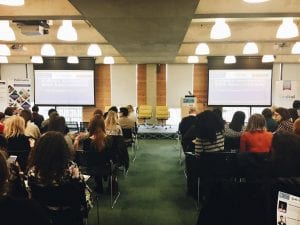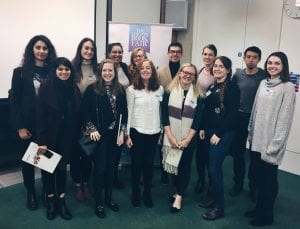Building Inclusivity in Publishing Conference 2017
By uczcmsm, on 15 November 2017
On Monday (13th November) the London Book Fair and the Publisher’s Association held the second Inclusivity in Publishing Conference. The day was insightful and motivating, filled with interesting and inspiring panel members. The aim of the day was to address the diversity issues in the industry with a big emphasis on what we can do to move forwards! A quick summary of the day goes:
Managing Disability in the Workplace
Kiren Shoman – SAGE Publishing (Chair), Andie Gbedeman and Mark Brooke – Dimensions UK, Vicki Partridge – Books Beyond Words
We need to move away from the misconceptions regarding what people are capable of and look at what every individual can offer. The recruitment process needs to be flexible; for example, working interviews are less intimidating for people with learning disabilities. Training can be provided for employees to help them communicate with colleagues who may communicate differently to them, including using pictures, accessible easy-read documents and ‘Listen-Up’ training. It is vital to provide positive narratives about people with disabilities in children’s books and not to make disability the focus.
Keynote: Matt Hancock, Minister of State for Creative Industries
Different perspectives are invaluable in such a diverse country. Positively, new imprints are emerging that are focused on diversity and schemes have been setup to improve diversity in entry level roles. A theme that continued throughout the day was the economic benefit of diversity. ‘Diversity is opening the door. Inclusion is inviting people through it’.
Mirroring Inclusivity – How Role Models are Building an Inclusive Industry
Simon Dawson-Collins and Nancy Adimora – HarperCollins
Role models need to reflect the diversity in society so that all young people can see themselves mirrored in higher roles. To ensure this happens, there need to be lots of different people involved in the recruitment process. They also mentioned the importance of talking about diversity. For our industry this will both develop a more diverse readership and the ability to understand and reach them in the employment force. Unconscious bias training should be given to recruitment employees, and to as many members of staff as possible.
Looks Like Me
Selma Nicholls
Selma told us the story of her daughter feeling out of place in society and not considering herself beautiful because of the images she was bombarded with everyday. Selma, passionately and proactively, then told us what she has done to change this. Looks Like Me is a talent and casting agency that strives to create imagery that reflects all young people. They work with many companies and started the incredible campaign: #sowhiteproject. She invited us to be the change we want to see, a call for all of us to address injustice.
Getting Writers from Minorities Published – Supply Chain Challenges
Chris Gribble – Writer’s Centre Norwich (Chair), Sharmaine Lovegrove – Dialogue Books, Emma Paterson – Rogers, Coleridge & White, Monica Parle – First Story.
There needs to be a genuine desire to make diversity happen. It’s not about the industry doing BAME citizens a favour, it’s about what they can do for us. The panel discussed ways in which we can achieve truly publishing for the whole of society: being less London-centric and making jobs more transparent (so people know of the abundant roles in publishing and can strive for them). We should look forward to the day that this conversation can end.
Audience Development: British Asian Community
Abir Makherjee
As a British Asian, Abir Makherjee says that we must change to cater to the demands of this changing society. As an accountant, Abir was appalled by how much further ahead the finance industry are in battling this issue. Paying for diverse talent is not an expense, it is an investment. We need to see growth in genre fiction from BAME writers, to extend marketing into other channels, to forge links with key community organisations, to take minority authors into schools and societies. Publishers need to be more culturally aware.
Broadening Inclusivity in Entry-Level Recruitment in Publishing
Nancy Roberts – Business Inclusivity (Chair), Linas Alsenas – Pride in Publishing, Heidi Mulvey – Cambridge University Press, Siena Parker – Penguin Random House
This panel discussed the ways in which their companies are trying to increase diversity. CUP have created many apprenticeship roles for people leaving school. Penguin Random House have started a randomised work experience program to give everyone an equal opportunity. They also now use video interviews and other technologies for the recruitment process to focus on talent rather than ‘type’ of person. Linas Alsenas has recently created ‘Pride in Publishing’ which aims to create a networking and social space for LGBTQ+ employees.
Diverse City
Jamie Beddard
Working in the arts industry, Jamie described how storytelling is key to: understanding, empathy, contextualising and re-imaging. We need to be telling untold stories and listen to unheard voices to develop a more inclusive and understanding society. We need to value people’s differences.
June Sarpong in conversation with Razia Iqbal
Razia and June discussed June Sarpong’s new book, Diversify: Six Degrees of Integration, and her career in the media industry. June addressed how far we have come and how far we still have to go. Her book not only addresses issues of race but also age, disability and gender. To hear more from June herself I would recommend listening to the CTRL, ALT, DEL podcast here.
The day finished with a presentation from Equal Approach on what they can do to help our industry diversify and company and individual’s pledges to address this issue and move forward, hopefully ending the discussion altogether.
To see more follow #inclusivityconf2017
 Close
Close



